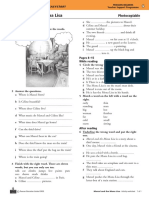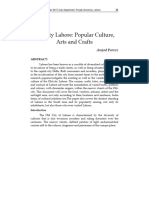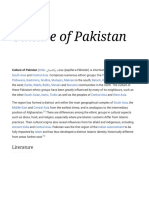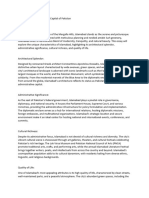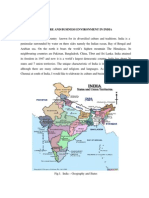Culture of Rawalpindi
Culture of Rawalpindi
Uploaded by
M Salman AminCopyright:
Available Formats
Culture of Rawalpindi
Culture of Rawalpindi
Uploaded by
M Salman AminOriginal Description:
Copyright
Available Formats
Share this document
Did you find this document useful?
Is this content inappropriate?
Copyright:
Available Formats
Culture of Rawalpindi
Culture of Rawalpindi
Uploaded by
M Salman AminCopyright:
Available Formats
Rawalpindi, commonly known as Pindi, is a city located in the Punjab province of
Pakistan, adjacent to the capital city of Islamabad. As one of the oldest cities in
the region, Rawalpindi has a rich cultural heritage deeply influenced by its
history, traditions, and diverse population. Here are some key aspects that
highlight the culture of Rawalpindi:
Historical Significance: Rawalpindi has a long history dating back to ancient times
and has been ruled by various civilizations, including the Mauryans, Ghaznavids,
Mughals, and British. The city's historical significance is reflected in its
architecture, landmarks, and cultural heritage.
Military Tradition: Rawalpindi has a strong military presence due to its strategic
location and the presence of Pakistan's General Headquarters (GHQ). The military
tradition is an integral part of the city's culture, with several military
institutions, cantonments, and defense-related activities.
Traditional Bazaars: Rawalpindi's bazaars and markets are bustling centers of
activity and commerce. Raja Bazaar, Sarafa Bazaar, and Commercial Market are some
of the famous bazaars where visitors can find a variety of goods, including
textiles, jewelry, handicrafts, and local delicacies.
Religious Sites: Rawalpindi is home to various religious sites, including mosques,
temples, churches, and gurdwaras. The city's religious diversity is a reflection of
its multicultural population.
Food Culture: The city's food scene is diverse, offering a wide range of
traditional Pakistani dishes, street food, and international cuisines. Food
streets, such as Liaquat Bagh Food Street, are popular destinations for locals and
tourists to savor the delicious flavors.
Cultural Events: Rawalpindi hosts several cultural events and festivals throughout
the year. Urs celebrations of Sufi saints, Basant festival (kite-flying), and
religious festivals like Eid ul-Fitr and Eid ul-Adha are celebrated with enthusiasm
and fervor.
Folk Music and Arts: Rawalpindi has a vibrant folk music and arts culture. Folk
singers and musicians perform traditional songs at weddings and cultural events,
keeping alive the region's musical heritage.
Education and Learning: Rawalpindi is a center for education, with numerous
schools, colleges, and universities. The city's institutions contribute to its
intellectual and academic culture.
Sports: Like many other cities in Pakistan, cricket is the most popular sport in
Rawalpindi. The city has produced talented cricketers who have represented Pakistan
at the international level.
Hospitality: Rawalpindi is known for its warm and welcoming hospitality. The locals
are friendly and hospitable, making visitors feel at home in the city.
Overall, Rawalpindi's culture is a vibrant blend of history, tradition, and
modernity. The city's diverse population and its strategic location near Islamabad
contribute to its unique cultural identity, making it an essential part of
Pakistan's cultural landscape.
You might also like
- ASSIGNMENT 1: Pakistan's National Culture Reflects Unity in Diversity. ExplainDocument4 pagesASSIGNMENT 1: Pakistan's National Culture Reflects Unity in Diversity. ExplainAlicia100% (4)
- Easystart, Marcel and The Mona Lisa AWDocument2 pagesEasystart, Marcel and The Mona Lisa AWVlad-NicolaeAchimNo ratings yet
- JaveriaDocument32 pagesJaveriaYAMNA MEHAKNo ratings yet
- Culture of KarachiDocument1 pageCulture of KarachiM Salman AminNo ratings yet
- Punjabi CultureDocument2 pagesPunjabi CultureAsad is LegendNo ratings yet
- Culture of IslamabadDocument1 pageCulture of IslamabadM Salman AminNo ratings yet
- Document 33Document2 pagesDocument 33SyedMuhammad AfnanNo ratings yet
- Title - A Culinary Journey Through The Heart of LucknowDocument93 pagesTitle - A Culinary Journey Through The Heart of Lucknowlaaaaaaaaaaaaaaa81No ratings yet
- Lok MelaDocument3 pagesLok MelacarlotaafernandesNo ratings yet
- LahoreDocument1 pageLahoreaiman razaNo ratings yet
- Culture in DelhiDocument2 pagesCulture in Delhisachin shahNo ratings yet
- Food Markets of Delhi - DFDocument12 pagesFood Markets of Delhi - DFrejoyraj49No ratings yet
- Culture of MultanDocument1 pageCulture of MultanM Salman AminNo ratings yet
- City Heritage Can Play A Crucial Role in The Branding of A CityDocument13 pagesCity Heritage Can Play A Crucial Role in The Branding of A CityRIMA MELATI ANGGRAENINo ratings yet
- Culture of Pakistan PresentationDocument15 pagesCulture of Pakistan PresentationAli WaqarNo ratings yet
- My CityDocument10 pagesMy Cityfevebap566No ratings yet
- Cultural ExpressionsDocument124 pagesCultural ExpressionsHala Mubeen KhaleelNo ratings yet
- Cultural Impact of Tourism in LucknowDocument17 pagesCultural Impact of Tourism in LucknowSabeena AbidiNo ratings yet
- Culture of Provinces of PakistanDocument6 pagesCulture of Provinces of PakistanZeeshan Mehdi100% (13)
- Booklet of PakistanDocument23 pagesBooklet of PakistanZeeshan Mehdi100% (1)
- VaranasiDocument2 pagesVaranasiHuman Library ATE World TalkNo ratings yet
- Exploring The Rich Culture of PunjabDocument8 pagesExploring The Rich Culture of Punjabveenakumari108No ratings yet
- Travel PPTDocument19 pagesTravel PPTshreyabonde0No ratings yet
- Wepik Unveiling The Tapestry of Punjab Exploring Its Rich Traditions and Cultural Heritage 20231216060648AyYtDocument15 pagesWepik Unveiling The Tapestry of Punjab Exploring Its Rich Traditions and Cultural Heritage 20231216060648AyYtvineetak396No ratings yet
- UP Special - Model Answer _ DMP 03 (English)Document2 pagesUP Special - Model Answer _ DMP 03 (English)Mihir SinghNo ratings yet
- The Walled City of LahoreDocument5 pagesThe Walled City of Lahoreramsha younasNo ratings yet
- SharjahDocument1 pageSharjahMOHAMMED KANCHWALANo ratings yet
- Mumbai Cultural Melting PotDocument1 pageMumbai Cultural Melting PotAnesh RamiaNo ratings yet
- Udaipur CULTUREDocument9 pagesUdaipur CULTUREsaurabh-dugar-252No ratings yet
- 02 Eng31 2017Document13 pages02 Eng31 2017bdr363581No ratings yet
- Urban Renewal and Conservation - Kavita (2013mud008) - Lucknow Chawk BazaarDocument36 pagesUrban Renewal and Conservation - Kavita (2013mud008) - Lucknow Chawk Bazaartalmalenitish100% (1)
- Mazz PDFDocument44 pagesMazz PDFYAMNA MEHAKNo ratings yet
- CIPADocument10 pagesCIPASyed Israr HussainNo ratings yet
- Old City DhakaDocument2 pagesOld City Dhakashawonabdullah158No ratings yet
- Discovering Pakistan A Journey Into Its Geography, Culture, People, and Exquisite Food CuisinesDocument33 pagesDiscovering Pakistan A Journey Into Its Geography, Culture, People, and Exquisite Food CuisinesyggyayapNo ratings yet
- Pakstudy 2Document5 pagesPakstudy 2hanzlaumar879No ratings yet
- BahawalpurDocument27 pagesBahawalpurHizwa ZeeshanNo ratings yet
- Cultures of Pakistan Made by ArooshDocument17 pagesCultures of Pakistan Made by Aroosharooshf701No ratings yet
- Culture of Sindh: Name: Inamulah MemonDocument11 pagesCulture of Sindh: Name: Inamulah MemonInam MemonNo ratings yet
- Sector 34 DocumentationDocument20 pagesSector 34 DocumentationhiteshiNo ratings yet
- Culture of Pakistan: LiteratureDocument4 pagesCulture of Pakistan: LiteraturefahadNo ratings yet
- Exploring Pakistan A Guide To Must Visit DestinationDocument9 pagesExploring Pakistan A Guide To Must Visit Destinationsaadbusiness5640No ratings yet
- Culture of Pakistan - WikipediaDocument17 pagesCulture of Pakistan - WikipediaHow To Do?No ratings yet
- HERITAGEDocument8 pagesHERITAGERavitej Kakhandaki100% (1)
- Odisha Tourism: We Bring U Culture We Bring U Heritage We Bring U Entrainment We Are The ODISHA !!Document16 pagesOdisha Tourism: We Bring U Culture We Bring U Heritage We Bring U Entrainment We Are The ODISHA !!Prince RajNo ratings yet
- IslamabadDocument2 pagesIslamabadjunaid.dahar2008No ratings yet
- Historical PlacesDocument5 pagesHistorical PlacesAoun MuhammadNo ratings yet
- Annex BhaktapurDocument8 pagesAnnex BhaktapurRaj K Pandey, MBS, MA, MPANo ratings yet
- Tourism of PakistanDocument11 pagesTourism of PakistanOsama IftikharNo ratings yet
- Dda pakDocument2 pagesDda pakPhysics FunNo ratings yet
- Bahrain Beyond the Skyline : Hidden Gems and Local WondersFrom EverandBahrain Beyond the Skyline : Hidden Gems and Local WondersNo ratings yet
- Synopsis For Thesis On Redevelopment of Pushkar Mela GroundDocument5 pagesSynopsis For Thesis On Redevelopment of Pushkar Mela GroundvishakhaNo ratings yet
- Pakistan Society and CultureDocument26 pagesPakistan Society and Cultureummehr2017No ratings yet
- Assignment 1 Social WorkDocument4 pagesAssignment 1 Social WorkInayat MandokhailNo ratings yet
- 1.cultural Tourism DefinitionDocument13 pages1.cultural Tourism Definitionnathan brionesNo ratings yet
- I.T. Holiday HomeworkDocument10 pagesI.T. Holiday HomeworkSamarth ChauhanNo ratings yet
- Hams A IndiaDocument4 pagesHams A India705095No ratings yet
- Impact of Tourism On Rajasthans 2Document14 pagesImpact of Tourism On Rajasthans 2rejoyraj49No ratings yet
- Delhi and Lakshadweep A Comparative ExplorationDocument10 pagesDelhi and Lakshadweep A Comparative Explorationhimanshu.23bcon1056No ratings yet
- University of South Asia - Faculty of Law Course Outline Law of Evidence IDocument5 pagesUniversity of South Asia - Faculty of Law Course Outline Law of Evidence IM Salman AminNo ratings yet
- Hafiz Muhammad Salman LLB Hons University of London (U.K) LLMDocument17 pagesHafiz Muhammad Salman LLB Hons University of London (U.K) LLMM Salman AminNo ratings yet
- Hafiz Muhammad Salman LLB Hons University of London (U.K) LLMDocument57 pagesHafiz Muhammad Salman LLB Hons University of London (U.K) LLMM Salman AminNo ratings yet
- Hafiz Muhammad Salman LLB Hons University of London (U.K) LLMDocument17 pagesHafiz Muhammad Salman LLB Hons University of London (U.K) LLMM Salman AminNo ratings yet
- Hafiz Muhammad Salman LLB Hons University of London (U.K) LLMDocument16 pagesHafiz Muhammad Salman LLB Hons University of London (U.K) LLMM Salman AminNo ratings yet
- Instructor: Hafiz Muhammad Salman LLB Hons University of London (U.K) LLMDocument16 pagesInstructor: Hafiz Muhammad Salman LLB Hons University of London (U.K) LLMM Salman AminNo ratings yet
- CV-Kamran1 - Copy One (Kamran Shaban Bhatti)Document2 pagesCV-Kamran1 - Copy One (Kamran Shaban Bhatti)M Salman AminNo ratings yet
- Introduction To Law PPDocument3 pagesIntroduction To Law PPM Salman AminNo ratings yet
- Hidden Gems in Florence 13 Unique Things To DoDocument3 pagesHidden Gems in Florence 13 Unique Things To Dor.tesfagioNo ratings yet
- 2-Player Card Game RulesDocument4 pages2-Player Card Game RulesJohn SoeNo ratings yet
- GeM Registration Form MechanicalDocument1 pageGeM Registration Form MechanicalPushpendra Kumar NigamNo ratings yet
- Serato DJ Pioneer CDJ-850 Quickstart GuideDocument5 pagesSerato DJ Pioneer CDJ-850 Quickstart GuideMac RNo ratings yet
- Verb Tense Exercise 1Document4 pagesVerb Tense Exercise 1RenieLuphNo ratings yet
- A Level Programming Project: Name: Charlotte Dillon Candidate Number: 2060 Centre Number: 14109Document240 pagesA Level Programming Project: Name: Charlotte Dillon Candidate Number: 2060 Centre Number: 14109simran mulchandaniNo ratings yet
- Omnichannel: The Path To ValueDocument7 pagesOmnichannel: The Path To ValueArun KsNo ratings yet
- HuyndaDocument191 pagesHuyndaRôpíp PhanNo ratings yet
- Entrepreneurship q1 Mod 3Document17 pagesEntrepreneurship q1 Mod 3Alice Lyddelle H. CaragayNo ratings yet
- Digital Marketing NotesDocument12 pagesDigital Marketing Notestanyatomar766No ratings yet
- Types of Poem - BalladDocument30 pagesTypes of Poem - Balladnajaahawesome100% (1)
- Core Strength ExercisesDocument3 pagesCore Strength ExercisesDelco L. Pete MartinNo ratings yet
- How Your Hot Water Cylinder Works: Low Pressure CylindersDocument6 pagesHow Your Hot Water Cylinder Works: Low Pressure CylindersNaveen BansalNo ratings yet
- Army of The Pharaohs - Swords Drawn LyricsDocument3 pagesArmy of The Pharaohs - Swords Drawn LyricsAmine ElNo ratings yet
- Major Hotel Chains (India) IHCL (Indian Hotels Company LTD.) - Taj Group of HotelsDocument11 pagesMajor Hotel Chains (India) IHCL (Indian Hotels Company LTD.) - Taj Group of HotelsVidit AgarwalNo ratings yet
- Complete The Sentences With The Present Simple or PresentDocument4 pagesComplete The Sentences With The Present Simple or PresentFida UzairNo ratings yet
- Dag-Om, Marjorie JDocument1 pageDag-Om, Marjorie JMarjorie Dag-omNo ratings yet
- Reverse Horse Profit Plan (48) : WelcomeDocument17 pagesReverse Horse Profit Plan (48) : WelcomeFloat KgbNo ratings yet
- Complete The Sentences/questions With A Verb From The Bubble.Document2 pagesComplete The Sentences/questions With A Verb From The Bubble.Patrycja BrengoszewskaNo ratings yet
- Apparel and Footwear in Indonesia - Analysis: Country Report - Feb 2020Document3 pagesApparel and Footwear in Indonesia - Analysis: Country Report - Feb 2020Elle ANo ratings yet
- Bhuira Jams-Inspiring StoryDocument4 pagesBhuira Jams-Inspiring StoryRjNo ratings yet
- CP Irmo 12042022 220720 125318Document138 pagesCP Irmo 12042022 220720 125318Antra AzadNo ratings yet
- FABRICSDocument21 pagesFABRICSKehinde OlaoluwaNo ratings yet
- Lista Carti Selectate 28 MaiDocument82 pagesLista Carti Selectate 28 MaiTamaş AndreiNo ratings yet
- Love Story - Taylor SwiftDocument1 pageLove Story - Taylor Swiftanas2299No ratings yet
- Exercise 1Document15 pagesExercise 1VŨ HUYỀN TRANGNo ratings yet
- Epp LP6Document7 pagesEpp LP6Jonalee EmfatNo ratings yet
- Lexington County Road Paving Priority List - AlphabeticalDocument7 pagesLexington County Road Paving Priority List - AlphabeticalThe State NewspaperNo ratings yet
- SMM Module 1 CGDocument83 pagesSMM Module 1 CGlogesswari srinivasanNo ratings yet

